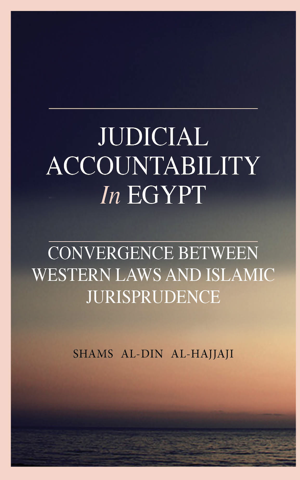
Judicial Accountability in Egypt: Convergence between Western Laws and Islamic Jurisprudence
Author: Shams Al-Hajjaji
Publisher: Luxembourg University Press
Publication Date: May 01, 2022
ISBN: 978-99959-0-735-8
Country: Luxembourg
Language: English
Keywords: Judicial Accountability , Egyptian Judiciary, Comparative Law, Islamic Jurisprudence, Constitutional Law, Judicial Reform, Judicial Independence, Judicial Appointments,
Abstract
This book offers a comprehensive analysis of judicial accountability in Egypt through a dual lens: Western legal frameworks and Islamic jurisprudence. It traces the historical evolution of the Egyptian judiciary, critiques its institutional structures, and explores the social, political, and legal imperatives for reform. Using comparative methodology, the study examines key elements of judicial accountability—appointment, independence, and disciplinary procedures—within both positive law traditions and classical Islamic legal theory. Drawing on constitutional texts, case law, and scholarly sources, the book reveals the convergence and divergence between secular and religious legal norms in shaping Egypt’s judicial system. It argues for a redefined, transparent model of judicial accountability grounded in both global standards and indigenous legal traditions, aiming to strengthen the rule of law in Egypt and beyond.
Description
Judicial Accountability in Egypt: Convergence Between Western Laws and Islamic Jurisprudence offers a groundbreaking examination of the mechanisms of judicial accountability in modern Egypt. Bridging legal history, comparative analysis, and Islamic legal theory, Dr. Shams Al Din Al-Hajjaji provides a rare and timely study that traces how Egypt’s judiciary has been shaped by colonial legacies, authoritarian politics, and evolving constitutional reforms.
Through a detailed analysis of judicial appointment, independence, and removal, the book explores the often-overlooked role of Islamic jurisprudence alongside Western legal models. It challenges the assumption that secular and religious legal systems must remain in conflict, instead revealing areas of potential convergence and legal synthesis.
A vital resource for scholars, legal practitioners, and policymakers, this book provides both critical insight and practical recommendations for those interested in constitutional reform, judicial independence, and the broader project of justice in the Middle East and North Africa.
Author biography
Dr. Shams Al Din Al-Hajjaji is a constitutional law scholar and former judge with extensive academic and legal experience across the Middle East, Europe, and the United States. He holds a PhD in Constitutional Law and Legal Institutions from the University of Luxembourg, a JSD and LLM in from the University of California, Berkeley, and an LLM in International and Comparative Law from the American University in Cairo. His judicial service in Egypt and his academic research have focused on judicial reform, Islamic jurisprudence, and comparative constitutionalism. Dr. Al-Hajjaji is the Executive Director of Luxembourg University Press and the founder of the Luxor Library, established in memory of his father, Professor Ahmed Shams Al-Hajjaji, and his brother, Mr. Nour Al-Hajjaji.
